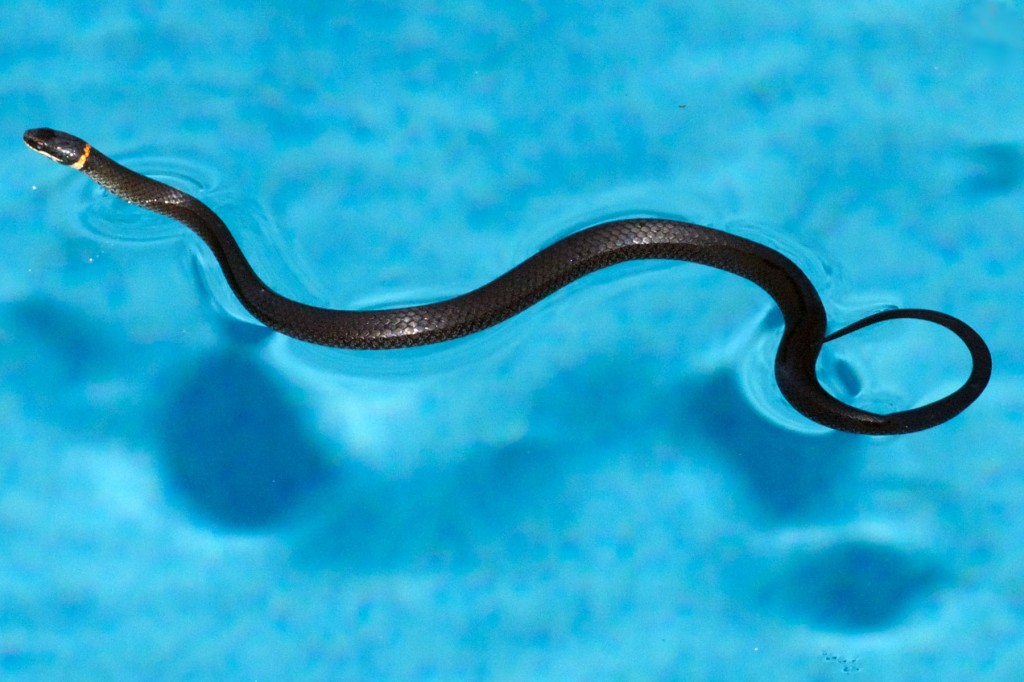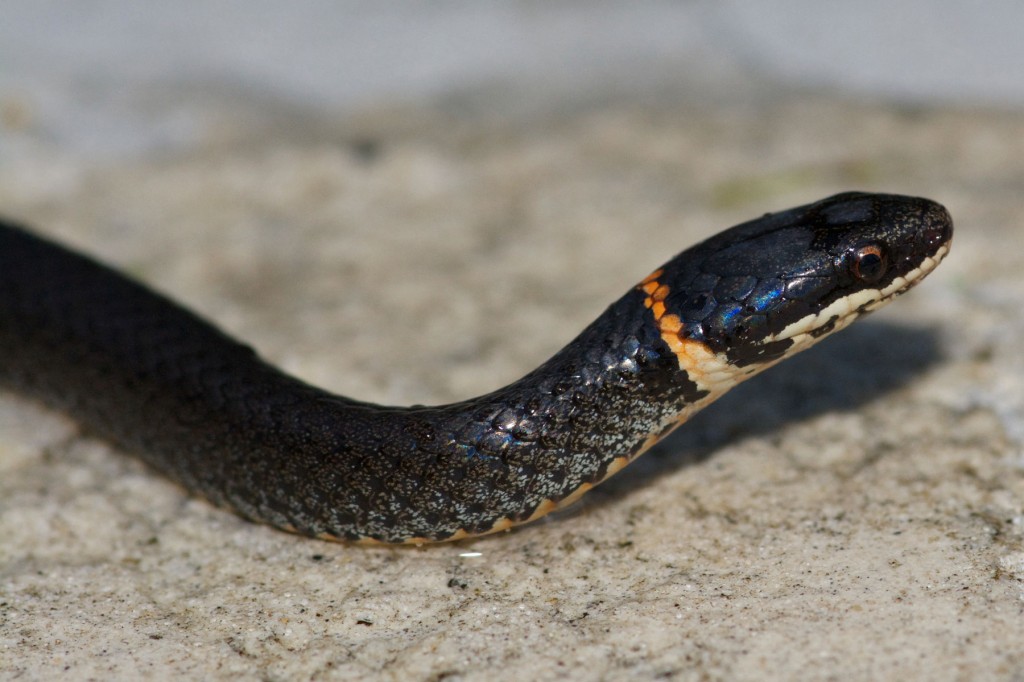Fear of snakes is instinctive. It just is. I imagine that most of those who have overcome it have done so through repeated exposure, knowledge gained over time. It’s not enough to know that an animal is harmless; you have to feel it. And if you don’t, you’ll still be scared by something as innocuous as a 5-inch long ringneck snake (Diadophis punctatus) that you might find swimming in your backyard pool.
I found that out one night this summer when Daniel was in the pool and I spotted one a few yards away from him. I didn’t want Daniel to scare it (or be scared by it), so I casually slipped back inside the house and ran to get the camera. The snake was a tiny little fellow and quite content to hang out in the corner of the pool. Unfortunately, that corner was a bit close to where the lad was playing on the steps of the shallow end. And despite my attempts to keep the snake out of Danny’s sight, that proved impossible. (Gee, for some reason my two-year-old son took an interest in whatever it was I was pointing my camera at in the pool. Go figure!).

When he noticed the snake, Daniel got very excited—scared, even—and left the pool; wouldn’t get back in until I’d removed the little dude.

Ringneck snakes are, according to the Florida Natural History Museum,
the most frequently found snake in Florida swimming pools—they crawl in to get a drink and then cannot climb out because they are too small to reach the lip of the pool.
I’m sure the herpetologists at the FLMNH have no problem handling snakes, even venomous ones. They’re trained to do so, and any fear they might once have felt has vanished with the confidence in their own abilities to handle these critters. However, their advice for the average homeowner understandably takes the layperson’s squeamishness into account:
If you find one in your pool, lift it out with the leaf skimmer or a dipnet and turn it loose in the shrubs where it can get back to eating things you do not want in your garden.
And I can vouch for the efficacy of their advice. After my two failed attempts to grab this little guy by hand (and he was barely longer than my hand’s width), he retreated to the middle of the pool, where I had to resort to the skimmer to scoop him out and get him to safety. Why did my first two attempts fail? Because the little guy wriggled out of my grasp, and I am no snake wrangler, no herpetologist with long experience in how to corral these critters. I’m just an amateur naturalist, interested in, but sometimes a bit scared of, nature. (I don’t have the ophidiophobia of an Indiana Jones, but they do creep me out, just a bit.)
Greene writes
Humans have always regarded snakes with a mixture of inquisitiveness and fear, of awe and revulsion, but whether these conflicting tendencies reflect genetically based predispositions or cultural traditions has long been controversial. In laboratory experiments and field observations, primate responses to snakes range from instant terror through curiosity and mobbing to immediate consumption; that some naive nonhuman primates react negatively to snakes suggests an inborn response with obvious survival value.
Now, mind you, just because a snake is small doesn’t mean it’s harmless. Pygmy rattlesnakes aren’t a whole lot bigger than ring-necked snakes, but their venom is quite potent. You won’t ever confuse them, because they look nothing alike, but it’s always best to treat an unknown snake with caution.
Cheers!
References
Gibbons, W. and M. Dorcas. 2005. Snakes of the Southeast. Athens: U of Georgia P.
Greene, H.W. 1997. Snakes: The Evolution of Mystery in Nature. Berkeley: U of California P.
Krysko, K.L., K.M. Enge, P.E. Moler. 2011. Atlas of Amphibians and Reptiles in Florida. Final Report, Project Agreement 08013, Florida Fish and Wildlife Conservation Commission, Tallahassee, FL.
Vigil, S. “Species Profile: Ringneck Snake.” Savannah River Ecology Laboratory. http://srelherp.uga.edu/snakes/diapun.htm

Are ringneck snakes poisonous?
No they are not .Very harmless.
No, snakes are not poisonous–some snakes are venomous, though. Ring necked snakes do have some venom, but it’s a very small amount, as you might imagine, and not harmful to humans unless you have an allergy to that particular type of venom. They’re nocturnal, so you mostly won’t see them….unless they’re in your pool! I rescued one from my pool filter today….he was floating on top of some leaves, curled up trying to stay afloat. I just grabbed him and put him in the bushes, and off he went…didn’t try to bite me or anything like that.
I see small ring snake in my pool area two days in a row (Florida) . Do you think their mom inside my patio delivered these two ?
Fear of snakes is not instinctive. Fear of snakes is a society driven learned behavior.
Please do not spread misinformation about a seriously important part of the ecology of most every ecosystem on this planet.
Ringneck snakes are inoffensive in every way.
The comments by Greene do not seem to take into account that primates in the wild are also communal animals who learn from their tribes, so again a learned behavior.